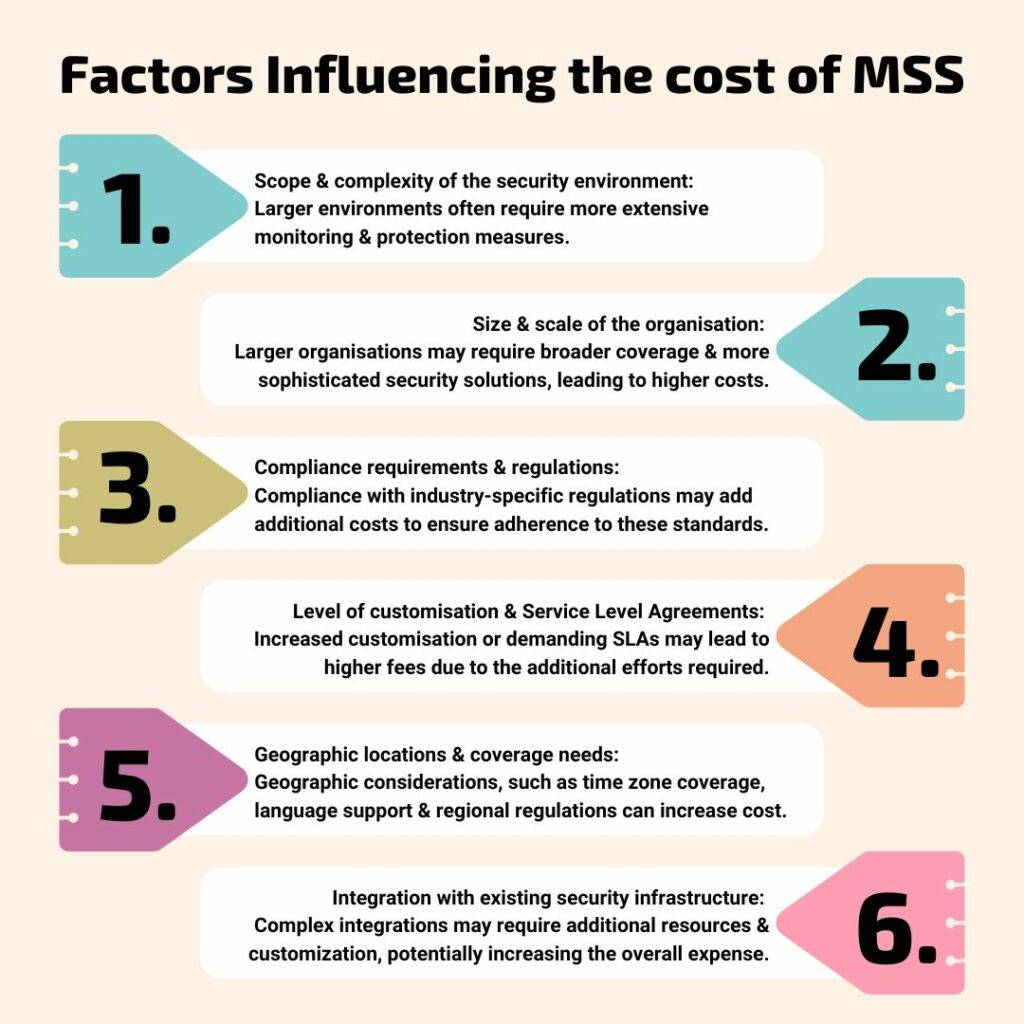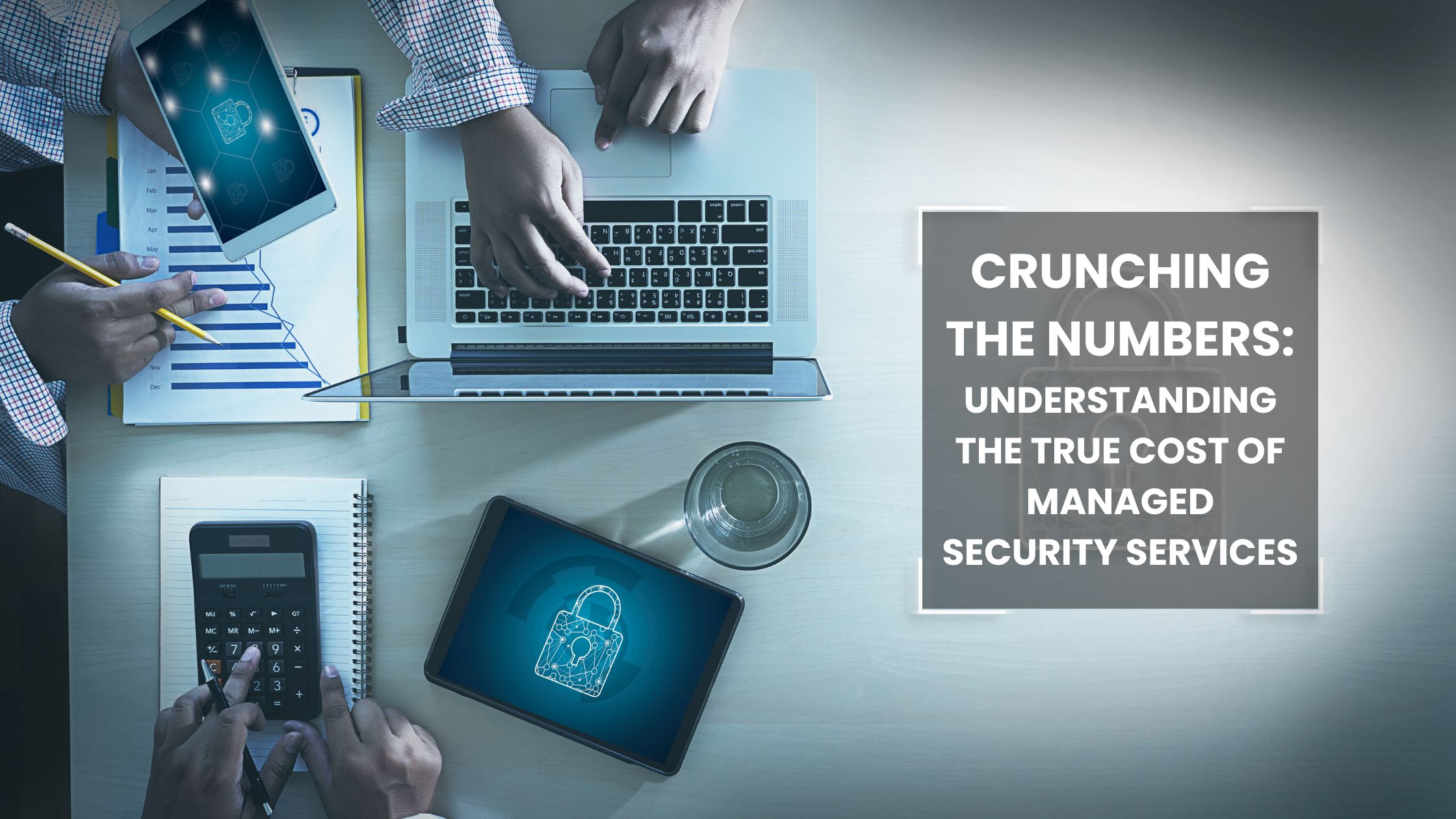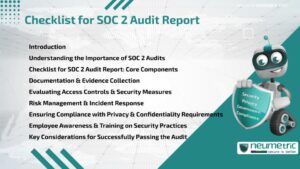Table of Contents
ToggleCrunching the Numbers: Understanding the true cost of Managed Security Services
Introduction
In today’s digital landscape, organisations face increasing cyber threats. To protect their assets & data, businesses rely on Managed Security Services [MSS]. MSS involves outsourcing security to specialised providers. They offer Proactive & Reactive measures like Monitoring, Threat Intelligence & Incident Response. MSS enhances security posture through expertise & advanced technologies.
While security is vital, organisations must consider financial implications. Knowing the true cost helps allocate resources, avoid surprises & align investments with budgets & priorities. Balancing cost & security is key. By understanding the true cost, organisations make informed decisions, improve security & manage budgets effectively.
This Journal explores cost factors of Managed Security Services, including setup, subscriptions, hardware, staffing, maintenance & incident response. We will also discuss the influences on cost, hidden expenses, pricing models & cost-effective strategies.
Understanding Managed Security Services
Managed Security Services [MSS] refer to the outsourcing of security responsibilities to specialised service providers. The primary objective of MSS is to enhance an organisation’s security posture & protect against cyber threats. MSS providers offer a range of proactive & reactive security measures to identify, prevent & respond to security incidents effectively. By leveraging their expertise, advanced technologies & round-the-clock monitoring, MSS providers help organisations establish a robust security framework.
Managed Security Services encompass a comprehensive suite of offerings. These services commonly include:
- Monitoring: Continuous monitoring of networks, systems & endpoints for suspicious activities & security incidents.
- Threat Intelligence: Gathering & analysing threat intelligence data to identify emerging threats & vulnerabilities.
- Incident Response: Rapid response & mitigation of security incidents, including containment, investigation & recovery.
- Vulnerability Management: Identifying & remediating vulnerabilities in the organisation’s infrastructure to reduce the risk of exploitation.
- Security Device Management: Administration & maintenance of security devices such as firewalls, intrusion detection systems & antivirus solutions.
- Log Analysis: Analysing logs & security event data to detect anomalies, identify potential threats & support incident investigations.
- Security Consulting: Providing expert guidance on security strategy, risk assessments, compliance & overall security program management.
Outsourcing security to MSS providers offers several advantages to organisations such as access to expertise, 24/7 monitoring & response, advanced technologies, scalability & flexibility, cost efficiency, focus on core competencies, compliance & regulations.
Cost Components of Managed Security Services
The Cost Components of Managed Security Services [MSS] can vary depending on the specific service provider & the needs of the organisation. However, here are the common Cost Components associated with MSS:
- Initial setup & deployment costs: Implementing MSS involves upfront expenses related to deploying necessary hardware & software, integrating with existing systems & establishing secure connections. These costs may vary depending on the complexity of the organisation’s infrastructure.
- Subscription or service fees: MSS providers typically charge ongoing fees for their services. The fees can be structured as monthly or annual subscriptions, based on the level of service required, the size of the organisation & the scope of coverage. The pricing model chosen should align with the organisation’s budget & security requirements.
- Hardware & software expenses: MSS often requires specialised Hardware & Software solutions to effectively monitor, analyse & respond to security threats. Organisations must consider the cost of these components, including any necessary upgrades or replacements over time.
- Personnel & staffing costs: While outsourcing security to MSS providers reduces the need for in-house security personnel, there may still be associated costs. Organisations should account for any internal staff dedicated to managing the relationship with the MSS provider or overseeing security operations.
- Ongoing maintenance & updates: Continuous maintenance, software updates & patches are crucial for maintaining the effectiveness of Managed Security Services. Organisations should anticipate costs related to ongoing support & the regular updating of security systems to stay resilient against emerging threats.
- Incident response & remediation expenses: In the event of a security incident, organisations may incur additional costs for incident response, investigation, remediation & any necessary legal or regulatory actions. It is essential to assess whether Incident Response is included in the MSS package or if there are additional charges for such services.
Factors Influencing the Cost of Managed Security Services

Several factors can influence the cost of Managed Security Services [MSS]. Here are some key factors to consider:
- Scope & complexity of the security environment: The size & complexity of an organisation’s IT infrastructure, including the number of endpoints, networks & systems, can influence the cost of MSS. Larger environments often require more extensive monitoring & protection measures.
- Size & scale of the organisation: The scale of the organisation plays a role in determining the cost of MSS. Larger organisations with multiple locations or subsidiaries may require broader coverage & more sophisticated security solutions, leading to higher costs.
- Compliance requirements & regulations: Compliance with industry-specific regulations, such as GDPR or HIPAA, may entail additional costs for MSS providers to ensure adherence to these standards. Organisations must factor in any compliance-related requirements & associated expenses.
- Level of customisation & Service Level Agreements [SLAs]: Tailoring MSS to specific organisational needs or establishing customised SLAs can affect the overall cost. Increased customisation or demanding SLAs may lead to higher fees due to the additional efforts required from the MSS provider.
- Geographic locations & coverage needs: Organisations with a global presence or those operating in multiple geographic regions may require enhanced coverage & support, which can impact the cost of MSS. Geographic considerations, such as time zone coverage, language support & regional regulations should be taken into account.
- Integration with existing security infrastructure: Integrating MSS with an organisation’s existing security infrastructure can also impact costs. Complex integrations may require additional resources & customization, potentially increasing the overall expense.
Comparing Pricing Models for Managed Security Services
When comparing Pricing Models for Managed Security Services [MSS], organisations have several options to consider. Here are some common pricing models used by MSS providers:
- Flat-rate or fixed-fee pricing: Some MSS providers offer a “Flat-Rate” or “Fixed-Fee” pricing model, where organisations pay a predetermined amount for a set range of services. This model provides cost predictability but may limit flexibility for scaling services as needed.
- Tiered pricing based on service levels: MSS providers may offer “Tiered Pricing” structures, providing different levels of service & corresponding costs. This allows organisations to choose the level of protection that aligns with their risk appetite & budget.
- Usage-based or consumption-based pricing: In this model, organisations pay for MSS based on their actual usage or consumption. It provides cost flexibility, particularly for organisations with fluctuating security needs.
- Value-based pricing models: Some MSS providers offer “value-based” pricing models, where costs are determined based on the perceived value delivered to the organisation. This approach takes into account the impact of the MSS provider’s services on the organisation’s security posture & risk reduction.
- Customised pricing for specific requirements: MSS providers may offer customised pricing options to meet unique organisational requirements. This approach allows organisations to tailor the services & costs to their specific needs, but it may involve additional negotiation & discussions.
Hidden costs & considerations beyond price
When considering Managed Security Services [MSS], there are several Hidden Costs & Considerations beyond the initial price that organisations should be aware of. These include:
- Transition & onboarding expenses: Moving to an MSS model may involve transition & onboarding costs, such as data migration, staff training & knowledge transfer. Organisations should consider these expenses when assessing the true cost of implementing MSS.
- Contract terms & exit fees: Organisations should carefully review the contract Terms & Conditions to understand any exit fees or penalties associated with terminating the relationship with an MSS provider. Such costs can significantly impact the overall cost of the service.
- Scalability & flexibility for future growth: As organisations evolve & grow, their security needs may change. Considering the scalability & flexibility of MSS is crucial to ensure that costs remain manageable as the organisation expands.
- Quality of service & expertise of the MSS provider: While cost is an important factor, organisations should also evaluate the quality of service & the expertise of the MSS provider. Opting for a lower-cost option that compromises on service quality can lead to inadequate protection & potentially higher costs in the long run.
- Data protection & privacy considerations: Organisations must prioritise data protection & privacy when engaging an MSS provider. Assessing the provider’s security practices, data handling processes & compliance with relevant regulations is essential to avoid potential legal or reputational consequences.
- Evaluation of overall ROI & cost-effectiveness: Understanding the true cost of MSS requires an evaluation of the overall Return On Investment [ROI]. Organisations should consider the long-term benefits, risk reduction & cost-effectiveness of MSS to make informed decisions.
Cost-Effective Strategies for Managed Security Services
Cost-effective strategies for implementing Managed Security Services [MSS] help optimising resource allocation & maximising value obtained from MSS. Strategies may include:
- Assessing & prioritising security needs: Conducting a thorough assessment of an organisation’s security needs allows for better alignment with the appropriate level of MSS. Prioritising critical assets & potential risks helps optimise cost-effectiveness.
- Conducting a thorough vendor evaluation & due diligence: Carefully evaluating MSS providers & conducting due diligence ensures selecting a reputable & reliable partner. Organisations should assess the provider’s track record, capabilities, certifications & references to make an informed decision.
- Negotiating pricing & contract terms: Engaging in negotiations with MSS providers can lead to favourable pricing & contract terms. Organisations should leverage their requirements, competition among providers & long-term commitments to secure the best possible deal.
- Aligning MSS costs with risk management priorities: Organisations should align MSS costs with their Risk Management Priorities. By focusing investments on areas with the highest risk exposure, organisations can optimise the allocation of resources & mitigate potential threats effectively.
- Regularly reviewing & optimising MSS utilisation: Continuously monitoring the effectiveness & utilisation of MSS allows organisations to identify areas for optimization. Adjusting service levels, fine-tuning solutions & adapting to changing security needs contribute to cost-effectiveness.
Conclusion
In conclusion, understanding the true cost of Managed Security Services [MSS] is crucial for organisations seeking to protect their digital assets & data effectively. By considering the various cost components, factors influencing pricing, hidden costs & cost-effective strategies, organisations can make informed decisions that balance cost & effective security management. It is imperative to take a holistic approach, considering long-term implications & the overall Return On Investment [ROI] of MSS in today’s evolving threat landscape.
(Learn more about Managed Security Services in: Managed Security Services Simplified).
FAQs
What is the difference between Managed Services & Managed Security Services?
Managed Services & Managed Security Services differ in their scope & focus. Managed Services refer to the outsourcing of IT infrastructure management & support, covering a broad range of IT functions such as network management, server administration & help desk support. On the other hand, Managed Security Services specifically focus on outsourced security operations & monitoring, including threat detection, incident response & vulnerability management.
What is an example of a managed security service?
An example of a Managed Security Service is a Security Information & Event Management [SIEM] service. SIEM services offer real-time monitoring, analysis & threat detection by collecting & correlating security event logs from various sources, helping organisations identify & respond to potential security incidents effectively.
What does a managed security provider do?
A Managed Security Service provider offers outsourced security services to organisations. They proactively monitor, detect & respond to security threats, manage security devices & infrastructure, provide threat intelligence, conduct vulnerability assessments & offer expert guidance to enhance an organisation’s security posture & protect against cyber threats.
Why do organisations use Managed Security Services?
Organisations use Managed Security Services to enhance their security posture & protect against cyber threats. By outsourcing security to specialised providers, they gain access to expertise, advanced technologies, 24/7 monitoring, proactive threat detection, incident response capabilities, cost efficiency & the ability to focus on core business functions while ensuring comprehensive protection for their assets & data.
What are the benefits of Managed Security Services?
Managed Security Services offer several benefits, including enhanced security posture, proactive threat detection, 24/7 monitoring & response, access to advanced technologies & expertise, cost efficiency, scalability, compliance support & the ability to focus on core business functions while ensuring comprehensive protection against cyber threats.





